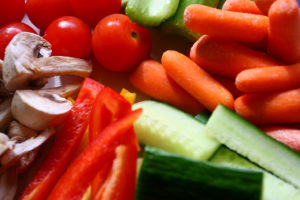 By Kay Leaman, Health Architect, HealthyDay HealthyLife
By Kay Leaman, Health Architect, HealthyDay HealthyLife
It sounds like a western. However, these don’t carry guns, ride horses or fight outlaws. These dirty dozen do, however, have an effect on our health.
Every year, the Environmental Working Group (EWG) releases its Dirty Dozen and Clean 15 list. This list is based on thorough testing of many fruits and vegetables. For 2024, here are a few results from EWG (ewg.org).
More than 90% of samples of strawberries, apples, cherries, spinach, nectarines and grapes tested positive for residues of two or more pesticides. A total of 209 pesticides were found. There are 13-23 pesticides in at least one sample of each item tested.
 More than 50 different pesticides were detected on every type of crop on the list except cherries (part of the dirty dozen).
More than 50 different pesticides were detected on every type of crop on the list except cherries (part of the dirty dozen).
Some of these pesticides and chemicals can be linked to cancer, reproductive damage and are also banned in Europe and the European Union.
In order of toxicity, the Dirty Dozen items are:
Strawberries
Spinach
Kale, collard and mustard greens
Grapes
Peaches
Pears
Nectarines
Apples
Bell and Hot peppers
Cherries
Blueberries
Green Beans (tested positive for a pesticide the EPA banned over 10 years ago)
The Clean 15 have the lowest counts of these residues:
Carrots
Sweet Potatoes
Mangoes
Mushrooms
Watermelon
Cabbage
Kiwi
Honeydew melon
Asparagus
Sweet peas (frozen)
Papaya (Can be produced from genetically modified seeds)
Onions
Pineapple
Sweet Corn (Can be produced from genetically modified seeds)
Avocados
With the dirty dozen, buying organic should be our first choice. We can also find alternatives like blackberries, oranges, bananas, etc. It doesn’t mean these are totally clean, but their testing results places them in between the dirty and the clean.
The small label on produce tells us how it was grown. A 4-digit code beginning with a 3 or 4 is conventionally grown. The 5-digit code starting with 9 is organic and the 5 digit code starting with 8 is genetically modified.
There is also a new label showing up on fruits and vegetables: Apeel touts itself as natural and safe; a plant-derived food additive. It creates a thin layer or skin on the vegetable and cannot be washed off. The description is a food additive, mono and diglycerides, by-products of fat and oil processing, classified as ‘emulsifiers’ and contain trans fats.
If you’d like to take a deep dive, nutritionwithjudy.com/meet-apeel is a good place to start.
As we start making changes, buying more organic of certain items, the stores will take notice and offer more organic options. I understand, especially in today’s world, paying more for organic can be a hard choice. Focus on the clean 15 and substitutions. It’s about starting new habits and making wise choices.
Here’s to Health!
HealthyDay Healthy Life
succeed.hdhl@gmail.com




























































